Contents
Scuba Diving Certification
Becoming a certified scuba diver opens up a world of underwater exploration and adventure. This article will guide you through the various scuba diving certification agencies, the certification process, types of certifications available, and the benefits of being a certified diver.
We have also prepared a comprehensive for Scuba Diving for beginners to learn more about scuba diving itself.
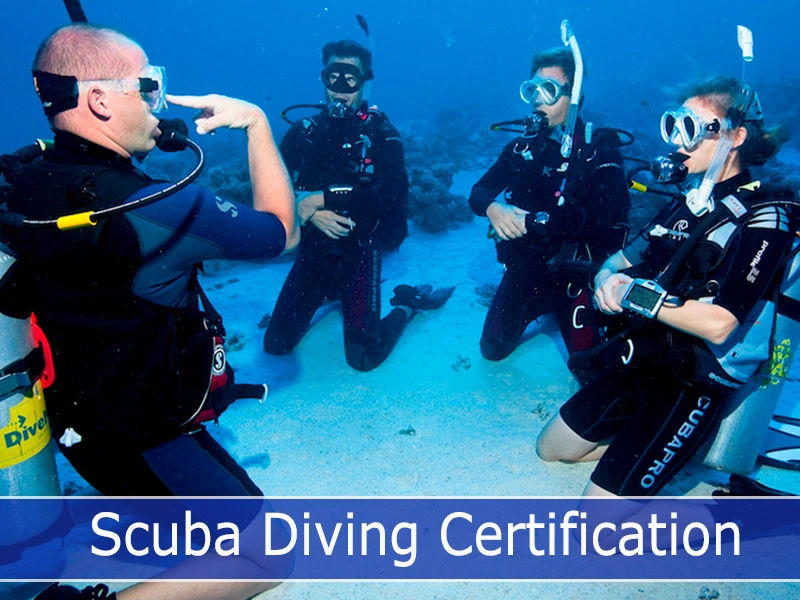
Table of Contents
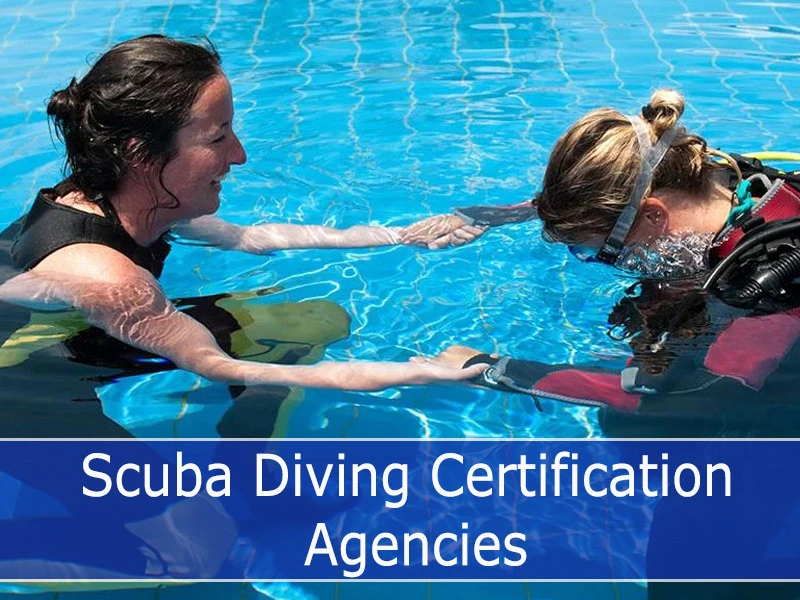
Scuba Diving Certification Agencies
There are several internationally recognized scuba diving certification agencies, such as:
- PADI (Professional Association of Diving Instructors)
- SSI (Scuba Schools International), NAUI (National Association of Underwater Instructors)
- BSAC (British Sub-Aqua Club)
- NAUI (National Association of Underwater Instructors)
These organizations set standards and guidelines for scuba diving training and certification but by far the leading dive organization is PADI which has been a leader in the industry for decades.
Difference between Certification Agencies
While there are differences in training methodology and course materials, all reputable certification agencies adhere to the standards set by the World Recreational Scuba Training Council (WRSTC). This ensures a consistent level of safety and competence among certified divers, regardless of the agency they choose.
Primarily the differences are more represented by the internal systems, marketing and overall exposure. Divers will not feel a difference in the quality of the curriculum during the courses.
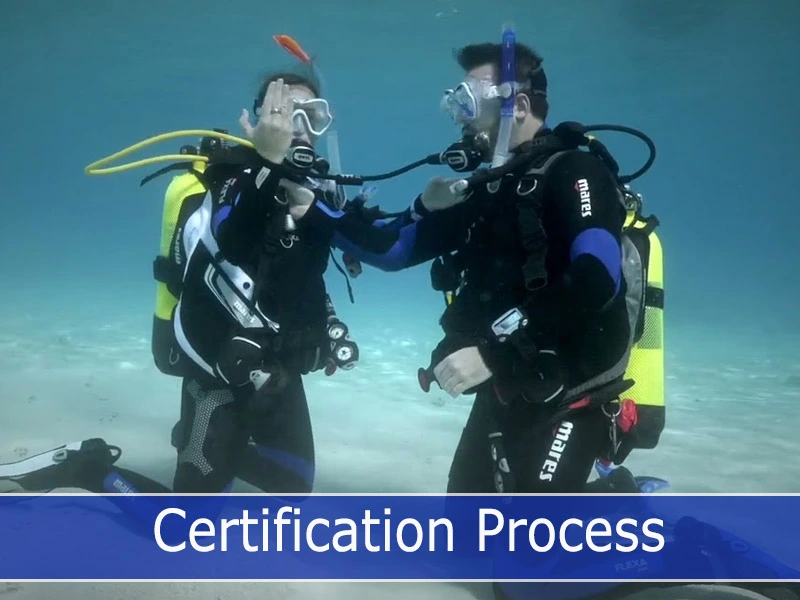
Certification Process
Prerequisites for Scuba Diving Certification
Before beginning a scuba diving certification course, there are some prerequisites that must be met.
Generally, students must be at least 10 years old (depending on the agency and course level), have basic swimming skills, and be in good physical health.
Some courses may require a medical evaluation to ensure the student can safely participate in scuba diving activities especially if there is a history of medical conditions. Ideally, divers should not be having the following medical conditions:
- Heart related issues
- High or Low blood pressure
- Active or exercise induced asthma
- Recent surgeries
- Recent flus
- Special medication that may impair one’s abilities
Training Program and Curriculum
A scuba diving certification course typically consists of three components: classroom or online learning, confined water (pool) training, and open water training.
Students learn about diving theory, equipment, and safety procedures before practicing essential skills in a controlled environment. Finally, they apply their skills and knowledge during supervised open water dives.
For divers who would like to experience scuba diving without the need to undergo the basic cscuba diving certification, there are programs created such as our introductory in Bali, Try Diving.
Theoretical Knowledge and Practical Skills
To obtain a scuba diving certification, students must demonstrate a solid understanding of diving theory, including dive planning, gas management, and decompression theory. They must also master practical skills such as buoyancy control, underwater navigation, and emergency procedures.
All of these elements are being studied and learned prior and during the course through the e-learning material and the confined water sessions.
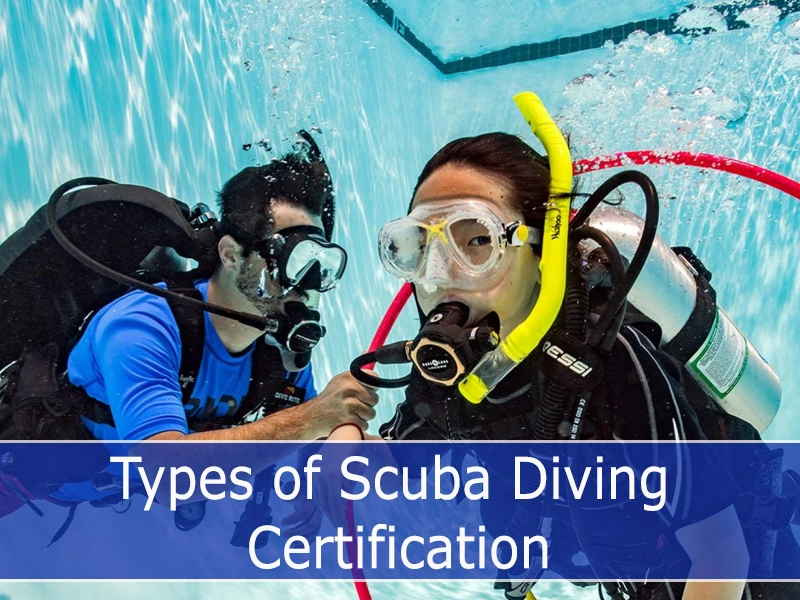
Types of Scuba Diving Certification
Open Water Diver Certification
The Open Water Diver certification is the entry-level course that teaches the foundational skills and knowledge required for recreational scuba diving. It all starts with the Open Water Diver course. Upon completion, divers are certified to dive up to 60 feet (18 meters) with a buddy.
The course typically takes 3 days to complete, depending on the learning pace and scheduling of the dive center.
Day one is a combination of classroom and pool training while day two and three are concentrated on open water diving and underwater exploration.
Advanced Open Water Diver Certification
The Advanced Open Water Diver certification builds upon the skills acquired in the open water course, introducing divers to new types of diving environments and techniques. This certification allows divers to explore deeper depths, up to 130 feet (40 meters) which is the maximum of recreational diving.
The course usually takes 2-3 days and consists of five adventure dives, each focusing on a specific skill or environment. The specific skills depend on the location where the courses are being conducted. Two out of the five adventure dives are mandatory: Deep Diver and Underwater Navigation. For example, for the PADI Advanced Open Water diver course in Bali, the other three adventures dives that can be chosen from are:
- Drift Dive (conducted in Nusa Penida)
- Night Dive (conducted in Padang Bai or Tulamben)
- Wreck Diver (conducted in Tulamben)
- Fish Identification
- Peak Performance Buoyancy
- Boat Diver
Rescue Diver Certification
The Rescue Diver certification focuses on advanced safety and emergency management skills, preparing divers to effectively handle diving emergencies and assist other divers in distress. the PADI Rescue Diver course is perhaps the most rewarding and fun course of the entire recreational diving.
This course typically takes 3 days to complete and involves practical scenarios, emphasizing problem-solving and decision-making.
As a prerequisite, the Emergency First Response course is mandatory to be conducted prior to the Rescue diver certification.
Divemaster Certification
The Divemaster certification is the first professional-level course, where divers learn to lead and supervise dives, assist with training, and develop their dive leadership abilities.
This course usually takes 4-8 weeks to complete, depending on the candidate’s availability and dive center scheduling. The divemaster course is the first step in the scuba diving career and the primary source of training for succeeding as a future diving instructor.
Specialty Diver Certifications
Specialty certifications allow divers to explore specific areas of interest, such as wreck diving, underwater photography, or deep diving.
These courses provide focused training and in-depth knowledge in their respective areas.
The duration of specialty courses varies, typically ranging from one day to a few weekends, depending on the subject and required dives.
Some of the most popular specialty diver certifications are:
- Wreck Diver
- Night Diver
- Peak Performance Buoyancy
- Deep Diver
You can learn more about the different certifications for scuba diving from the PADI Courses.
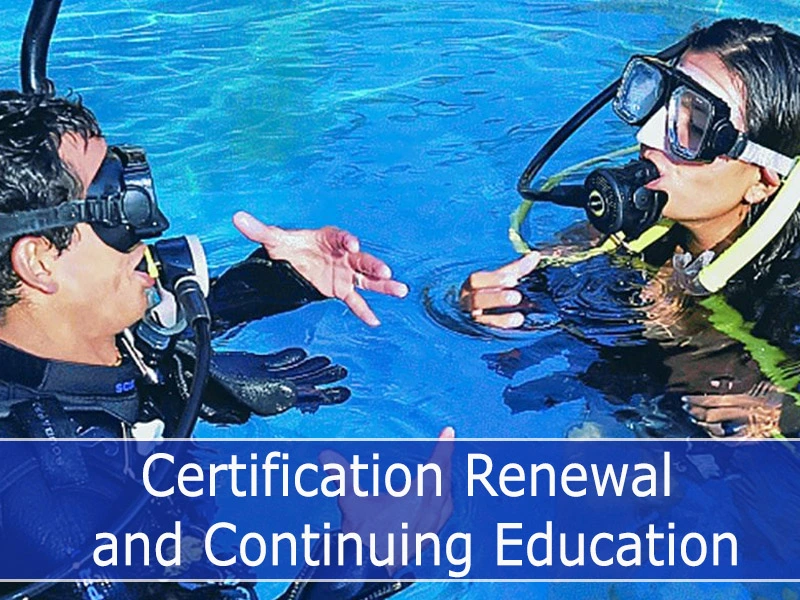
Certification Renewal and Continuing Education
Renewal Process and Requirements
While most scuba diving certifications do not expire, some organizations recommend refresher courses or skills updates for divers who have not been diving for an extended period, usually 6-12 months.
A refresher course depends on the dive center but a typical one takes approximately 30 minutes in confined water / swimming pool prior to going scuba diving. It is always recommended, especially if divers didn’t go scuba diving for more than 12 months to undergo a refresher course.
The refresher course helps with removing the anxiety that comes with the first dive in a long time.
Continuing Education Programs and Specializations
Continuing education programs offer divers the opportunity to advance their skills and knowledge, explore new areas of interest, and stay up-to-date with the latest diving techniques and equipment.
Many certification agencies provide a wide range of courses, from advanced certifications and specialties to professional-level training programs, ensuring lifelong learning and development for scuba divers.